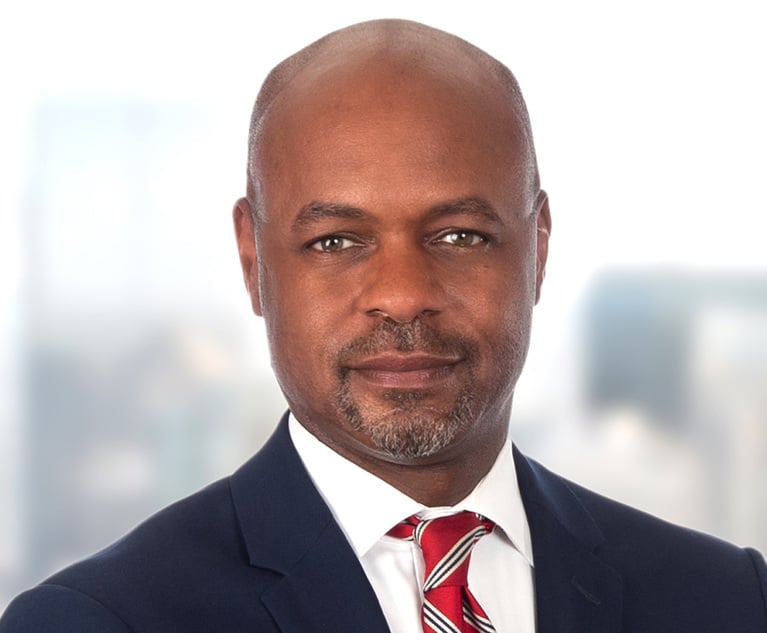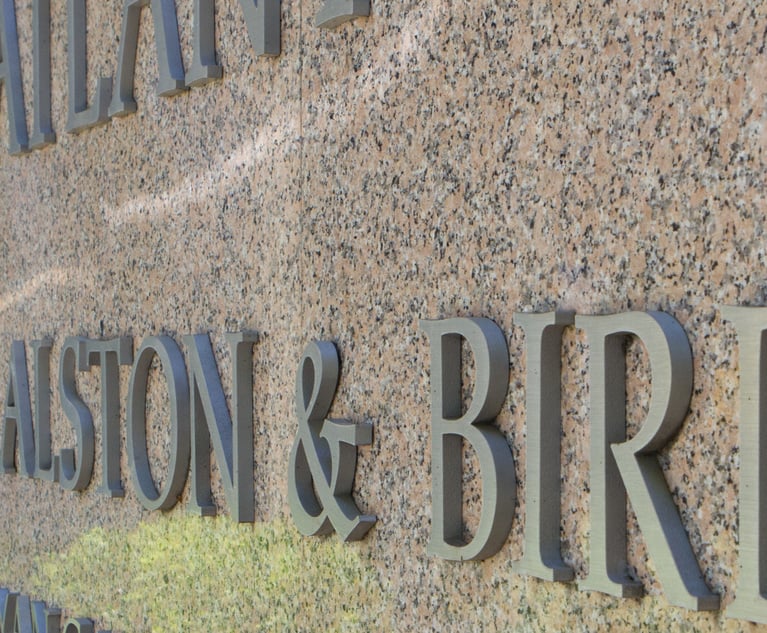 Darren Summerville (Photo: John Disney/ALM)
Darren Summerville (Photo: John Disney/ALM)Legal-Mal Appeal: Is Binding Arbitration Valid in Lawyer's Contract?
Attorneys for plaintiff's lawyer Darren Summerville and a former client have asked the Court of Appeals to decide whether a binding arbitration clause is enforceable in a legal malpractice case.
January 09, 2019 at 03:02 PM
8 minute read
Taking up an appeal in a legal malpractice case Tuesday, a panel of Georgia Court of Appeals judges were asked to decide whether an engagement agreement between a lawyer and client can contain an enforceable binding arbitration clause.
Arguing that the Georgia Arbitration Act had been carefully delineated by the Legislature to foreclose arbitration clauses in an array of litigation such as medical malpractice, personal injury and wrongful death claims, Hawkins Parnell & Young partner Kathryn Whitlock said no such stricture was placed on contracts for legal services.
 Kathryn Whitlock
Kathryn Whitlock
Despite the plaintiff's claims that the one-paragraph arbitration clause was “a little confusing,” the provision is completely straightforward and the corporate officer who signed it is a sophisticated and educated professional, said Whitlock, who represents attorney Darren Summerville and his Summerville Firm.
Arguing for the plaintiff, vein clinic Innovative Images, Roswell legal malpractice specialist Warren Hinds said the provision in question did not bind the parties to arbitration unless both parties agreed to do so and that there was no indication that anything other than fees disputes was covered by the agreement.
As written, Hinds said, the agreement both violates state and American Bar Association rules regarding adequate disclosure and exceeded the bounds of the Georgia Arbitration Act.
Arguing before a panel of Presiding Judge Anne Barnes and Judges Amanda Mercier and E. Trenton Brown III, Hinds said the provision at issue represented an “unconscionable” breach of public policy because it failed to warn the plaintiff of the rights it would give up, such as the right to a jury trial or appeal, if the defense position held.
Barnes seemed skeptical, observing that under prior precedent “very little is unconscionable in Georgia” in matters of contract law.
“We don't decide public policy here at the Court of Appeals, nor does the Supreme Court,” said Barnes, noting that such deliberations are left to the Legislature.
But “the Supreme Court does decide policy on the practice of law,” Hinds responded.
Under bar rules, he said, a lawyer has a duty to provide sufficient advice “so a client can make an informed decision” before signing a representation agreement.
The underlying case began with a legal battle between Innovative Images and a former doctor there. A Fulton County Superior Court judge awarding more than $545,000 to the plaintiff, Louis Prevosti, including more than $270,000 in legal fees in 2013.
Innovative retained Summerville and his firm that year to represent it in posttrial proceedings and any appeals.
Summerville filed a notice of appeal in 2014 but failed to request a transcript of a particular hearing until several months later.
In 2015, Prevosti asked the trial court to dismiss the appeal because the transcript was not timely filed, which it did. The Court of Appeals declined to hear an appeal of that order.
Prevosti again sued Innovative in 2016, seeking payment of the judgment. According to its complaint, Innovative “ultimately incurred in excess of $350,000 in attorney's fees and litigation costs successfully defending” that case, which was dismissed without prejudice in 2017. Summerville's firm was not involved in that litigation.
Later that year, Innovative sued Summerville in Fulton County State Court for legal malpractice, breach of contract and breach of fiduciary duties and sought unspecified economic and punitive damages.
Summerville asked the court to dismiss the case and compel arbitration, arguing among other things that the arbitration clause barred it.
The provision at issue said “any dispute arising under this agreement will be submitted to arbitration … under the procedures of the State Bar of Georgia Committee on the Arbitration of Attorney Fee Disputes, if concerning fees only, or by an arbitrator to be to be agreed to by the parties, if concerning any other matter. … The decision of any such arbitrator or arbitrators shall be binding, conclusive, and not appealable. In the event a dispute is not or cannot be arbitrated, the parties consent to the jurisdiction of and venue in the courts of Fulton County, Georgia.”
Judge John Mather declined to dismiss the case last May, observing that the defendants “raise an issue that is apparently one of first impression in Georgia: whether an attorney-client agreement may validly contain an arbitration clause.”
Mather's order noted that State Bar Rule 1.4 requires a lawyer to “explain a matter to the extent reasonably necessary to make informed decisions” and that the American Bar Association has said that, in cases involving fee disputes and legal malpractice claims, “depending on the sophistication of the client,” lawyers should “explain the possible adverse consequences as well as the benefits arising from execution of the agreement.”
“Here, the record contains no indication that any aspect of binding arbitration was discussed” with Innovative, Mather wrote.
“As the court finds that a mandatory arbitration clause appearing in an engagement agreement is enforceable only when preceded by a substantial explication of the rights affected by the clause, and such an explanation did not occur here, the court declines to enforce the provision,” Mather said.
During Tuesday's arguments, Mercier observed “some tension” between the Georgia Arbitration Act and state bar rules, to which Hinds replied that courts have repeatedly found that lawyers must follow bar rules regarding disclosure to prospective clients.
Whitlock countered that, until the contract was signed, there was no fiduciary relationship between Summerville and Innovative and that it would have constituted a bar violation for the lawyer to discuss it beforehand.
Barnes asked whether the case should be referred to the Supreme Court for resolution.
“I don't think it's necessary,” Whitlock said. “They've had that opportunity.”
Neither Whitlock nor Summerville responded to request for comment afterward, but Hinds said the case raises important policy questions.
“For these types of clauses to be enforceable, there has to adequate disclosure,” Hinds said. “Even under the Georgia Arbitration Act, agreements can be appealed. This contract doesn't even allow that.”
“I think it comes down to this: If these types of provisions are upheld, then clients are giving up valuable rights, and they need to know it.”
Lefkowitz Firm principal David Lefkowitz, who teaches legal malpractice law at the University of Georgia and has been following the case, said the outcome of the appeal is of major importance for lawyers and their clients.
This case “is not a dispute between a homeowner and a contractor who agreed to paint a house,” said Lefkowitz. “An attorney-client relationship includes fiduciary, legal and ethical obligations imposed by the Georgia Rules of Professional Conduct.”
The argument that Summerville was not obligated to explain the provision before signing the contract is “silly,” said Lefkowitz via email. “Prior to being retained, lawyers frequently provide advice to their prospective clients, including important deadline information, such as what the statute of limitations is for a claim.”
“A client can't make an informed decision to arbitrate without the lawyer informing him of the effects of the arbitration clause,” he said.
Bar rules “obviously require certain actions prior to the execution of a fee contract, including establishing reasonable attorney's fees, preserving important documents and maintaining confidentiality.
“The Court of Appeals clearly has the authority to determine if the fee contract violates the rules of professional conduct,” Lefkowitz said. “If, however, the Court of Appeals feels it cannot strike this arbitration provision, or deems it unenforceable, [it] should send the matter to the Supreme Court, the ultimate regulator of lawyers in Georgia.”
A statement from Georgia Trial Lawyers Association President Laurie Speed said GTLA “believes that lawyers owe a sacred duty of loyalty to their clients. This includes the responsibility for protecting the client's constitutional right to trial by jury, regardless of whether that is in the lawyer's best interest.
“This means that no one should be forced into a secretive, rigged arbitration process that favors the party with greater bargaining power,” it said.
This content has been archived. It is available through our partners, LexisNexis® and Bloomberg Law.
To view this content, please continue to their sites.
Not a Lexis Subscriber?
Subscribe Now
Not a Bloomberg Law Subscriber?
Subscribe Now
NOT FOR REPRINT
© 2024 ALM Global, LLC, All Rights Reserved. Request academic re-use from www.copyright.com. All other uses, submit a request to [email protected]. For more information visit Asset & Logo Licensing.
You Might Like
View All

Georgia Supreme Court Honoring Troutman Pepper Partner, Former Chief Justice
2 minute read

After 2024's Regulatory Tsunami, Financial Services Firms Hope Storm Clouds Break
Trending Stories
- 1Pennsylvania Firms Went All in on Mergers in 2024
- 2Avoiding Conflict When Relating Advice to an Adverse Party to Facilitate a Client Matter
- 3'We Are Far From Finished': Amazon Pro Bono Program Raises Sights After Championing Justice From West Virginia to Ukraine
- 4AI Laws To Keep An Eye On In 2025
- 5Topping Kirkland, Weil Won the Most Valuable Major Bankruptcy Retentions of 2024
Who Got The Work
Michael G. Bongiorno, Andrew Scott Dulberg and Elizabeth E. Driscoll from Wilmer Cutler Pickering Hale and Dorr have stepped in to represent Symbotic Inc., an A.I.-enabled technology platform that focuses on increasing supply chain efficiency, and other defendants in a pending shareholder derivative lawsuit. The case, filed Oct. 2 in Massachusetts District Court by the Brown Law Firm on behalf of Stephen Austen, accuses certain officers and directors of misleading investors in regard to Symbotic's potential for margin growth by failing to disclose that the company was not equipped to timely deploy its systems or manage expenses through project delays. The case, assigned to U.S. District Judge Nathaniel M. Gorton, is 1:24-cv-12522, Austen v. Cohen et al.
Who Got The Work
Edmund Polubinski and Marie Killmond of Davis Polk & Wardwell have entered appearances for data platform software development company MongoDB and other defendants in a pending shareholder derivative lawsuit. The action, filed Oct. 7 in New York Southern District Court by the Brown Law Firm, accuses the company's directors and/or officers of falsely expressing confidence in the company’s restructuring of its sales incentive plan and downplaying the severity of decreases in its upfront commitments. The case is 1:24-cv-07594, Roy v. Ittycheria et al.
Who Got The Work
Amy O. Bruchs and Kurt F. Ellison of Michael Best & Friedrich have entered appearances for Epic Systems Corp. in a pending employment discrimination lawsuit. The suit was filed Sept. 7 in Wisconsin Western District Court by Levine Eisberner LLC and Siri & Glimstad on behalf of a project manager who claims that he was wrongfully terminated after applying for a religious exemption to the defendant's COVID-19 vaccine mandate. The case, assigned to U.S. Magistrate Judge Anita Marie Boor, is 3:24-cv-00630, Secker, Nathan v. Epic Systems Corporation.
Who Got The Work
David X. Sullivan, Thomas J. Finn and Gregory A. Hall from McCarter & English have entered appearances for Sunrun Installation Services in a pending civil rights lawsuit. The complaint was filed Sept. 4 in Connecticut District Court by attorney Robert M. Berke on behalf of former employee George Edward Steins, who was arrested and charged with employing an unregistered home improvement salesperson. The complaint alleges that had Sunrun informed the Connecticut Department of Consumer Protection that the plaintiff's employment had ended in 2017 and that he no longer held Sunrun's home improvement contractor license, he would not have been hit with charges, which were dismissed in May 2024. The case, assigned to U.S. District Judge Jeffrey A. Meyer, is 3:24-cv-01423, Steins v. Sunrun, Inc. et al.
Who Got The Work
Greenberg Traurig shareholder Joshua L. Raskin has entered an appearance for boohoo.com UK Ltd. in a pending patent infringement lawsuit. The suit, filed Sept. 3 in Texas Eastern District Court by Rozier Hardt McDonough on behalf of Alto Dynamics, asserts five patents related to an online shopping platform. The case, assigned to U.S. District Judge Rodney Gilstrap, is 2:24-cv-00719, Alto Dynamics, LLC v. boohoo.com UK Limited.
Featured Firms
Law Offices of Gary Martin Hays & Associates, P.C.
(470) 294-1674
Law Offices of Mark E. Salomone
(857) 444-6468
Smith & Hassler
(713) 739-1250






